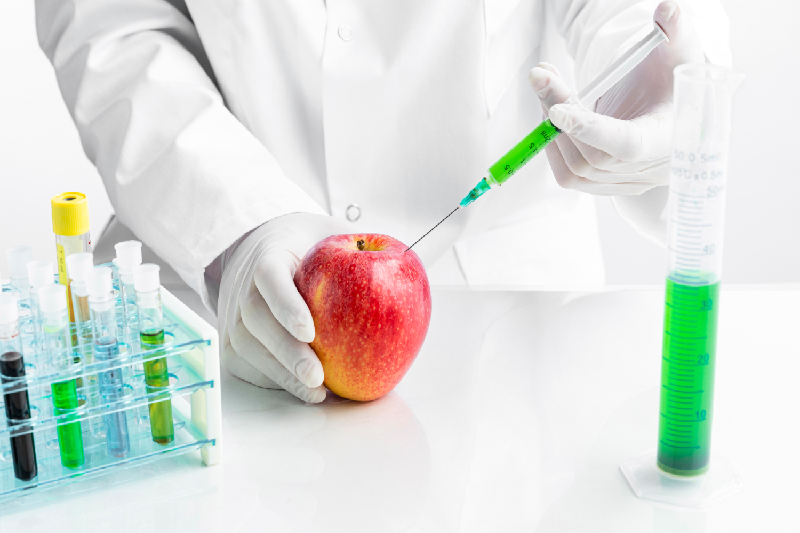
BITS Pilani-Hyderabad Researchers Develop Portable Device to Detect Pesticides on Food
Hyderabad researchers at BITS Pilani have unveiled a groundbreaking solution to ensure safer food consumption through on-site pesticide detection. The innovative portable chemiluminometer, developed in collaboration with UiT – The Arctic University of Norway, promises a simple, cost-effective, and accurate method to detect harmful pesticide residues on fruits and vegetables, even outside laboratories.
A Compact Solution for Food Safety
The device, designed as a handheld chemiluminometer, operates on the principle of chemiluminescence (CL), a chemical reaction that produces visible light. The process is simple: users wash a fruit or vegetable and feed the wash water into the device. If pesticides are present, the water reacts with a reagent, emitting light. The intensity of this light indicates the concentration of pesticide residues.
Pavar Sai Kumar, Senior Research Associate at BITS, explains, “Our device is portable and user-friendly. It can be taken to markets or used at home to check whether produce contains pesticides. This is a critical step toward safer food, especially in areas with limited access to laboratories.”
The entire setup is highly affordable, costing between Rs 5,000 and Rs 10,000, making it accessible to individual consumers and small-scale food vendors.
Overcoming Limitations of Conventional Testing
Traditional pesticide detection methods require specialized laboratories, expensive equipment, and trained personnel. They are often complex, time-consuming, and inaccessible in remote or resource-limited areas. The new portable chemiluminometer bypasses these barriers, offering a rapid and convenient solution for real-time testing.
The BITS researchers emphasise that the device can provide quantitative results, enabling users to gauge the presence and concentration of pesticides. This precision makes it a reliable alternative to conventional laboratory testing, bringing advanced food safety measures to the consumer level.
How the Device Works
This innovation's heart is a test strip known as a microfluidic paper-based analytical device (µPAD). Essentially, it is a filter paper treated with a chemical reagent. When pesticide-laden water is applied to this strip, a chemiluminescent reaction produces light.
A high-resolution camera captures this light, while an integrated microcontroller analyses the intensity and quantitatively measures pesticide levels. This technology ensures accurate readings without requiring highly trained personnel, making it practical for everyday use.
Reshma PA, a PhD scholar involved in the project, explains, “The platform can be adapted chemically to detect various substances. While we have tested it on fruits and vegetables, it can also be applied to food adulteration tests and biomarker detection in items like oils and millets.”
Broader Applications and Potential
Beyond pesticide detection, the device holds promise for broader food safety applications. Its adaptability allows researchers to modify the chemical reagents to detect different contaminants. This could include testing for adulterants in oils, milk, and other food products and identifying biomarkers critical for quality control in food processing.
The chemiluminometer's portability and affordability make it especially suitable for resource-constrained regions, small farms, local markets, and households. Providing on-the-spot results empowers consumers and vendors to make informed decisions about food safety.
Research Collaboration and Publication
This innovative device was developed through international collaboration. BITS Pilani-Hyderabad partnered with UiT—The Arctic University of Norway—to leverage advanced chemiluminescence technology. Their combined expertise has produced a practical tool that blends scientific precision with ease of use.
The research detailing the device's design, functioning, and applications has been published in the Microchemical Journal, contributing to global knowledge in rapid, portable food testing technologies.
Making Food Safety Accessible
The device's affordability, combined with its portability, is a major breakthrough in democratizing food safety. Consumers and small-scale food vendors can now easily screen produce without relying on centralized laboratories, which are often expensive and time-consuming. This accessibility could significantly reduce health risks associated with pesticide consumption, especially in rural and semi-urban areas.
Furthermore, by providing immediate feedback, the device can encourage farmers and sellers to adopt safer agricultural practices, gradually improving overall food quality and public health standards.
Future Prospects and Innovation
While the chemiluminometer is currently being used to test pesticide residues on fruits and vegetables, the research team envisions a broader application of this technology. Its ability to detect multiple substances through chemical adaptation opens doors to innovations in food adulteration monitoring, quality control in food processing, and potentially even clinical and biomarker detection.
Reshma PA notes, “Our goal is to broaden the scope of this technology, ensuring that it addresses a range of food safety and quality challenges. This is the beginning of a larger vision to make safe, high-quality food accessible to all.”
A Step Towards Safer Food for All
The invention by BITS Pilani-Hyderabad researchers marks a significant step in bridging the gap between laboratory-level testing and consumer-level safety. By making food safety testing portable, affordable, and easy to use, this device has the potential to revolutionize the way pesticides are monitored and managed in India.
It empowers individuals to take control of their food safety, supports vendors in maintaining quality standards, and contributes to public health awareness. The BITS team’s dedication to innovation, practicality, and social impact exemplifies the transformative potential of scientific research applied to everyday challenges.
Conclusion
The portable chemiluminometer developed by BITS Pilani-Hyderabad represents a fusion of science, practicality, and social responsibility. By enabling rapid on-site pesticide detection, the device ensures that all safe food is within reach. With further applications in food adulteration and biomarker detection, this innovation promises to elevate food safety standards nationwide, particularly in remote or underserved regions. This remarkable example of research translating into tangible societal benefits demonstrates how technology can protect health while empowering communities.



